Disclaimer: Some of the links here are affiliate links. Muslim Solo Travel receives a small commission AT NO EXTRA cost to you if you use the links. Hope you find this guide helpful!
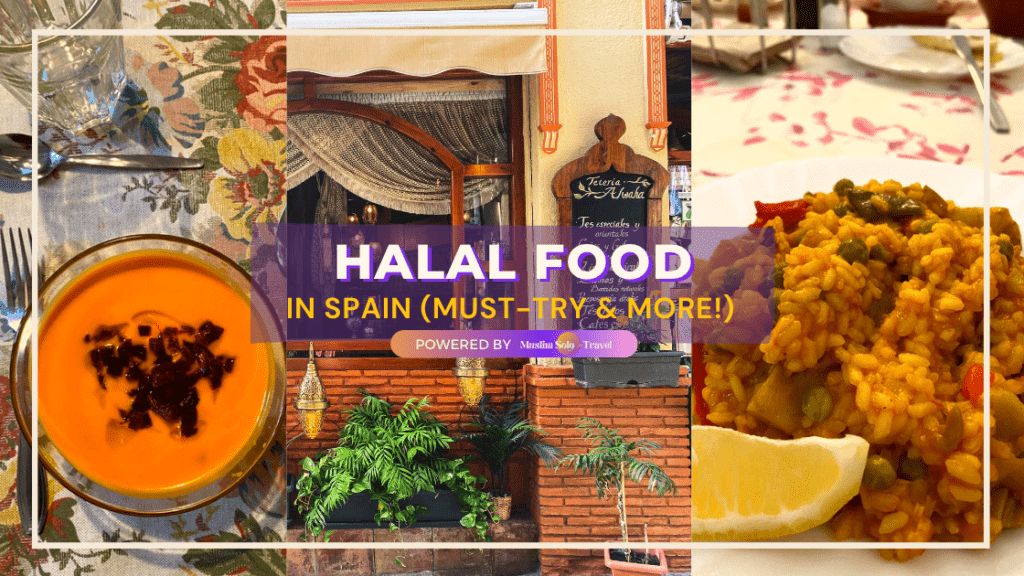
Looking for Halal food in Spain while traveling solo?
While these days it has been easy for Muslims to find Halal food in Spain, sometimes you want to go beyond the regular meal that is guaranteed Halal like kebab, falafel, and what not, and go local.
But how do we distinguish what is Halal and what’s not?
Let’s dive in!
- Dining Alone for Muslimah Solo Travelers
- Muslim-friendly/Vegan Spanish Local Food
- Moroccan Halal Food
- Freidurías (Fried Fish Shops)
- Non-Halal Words to watch out: Jamon (Ham)
- Halal-certified Restaurants/Services/Kitchen in Spain
- “Halal” Establishments in Spain that Offer Alcohol
- Self-claim Halal & Muslim-owned Restaurants
- Halal Food in Spain
Dining Alone for Muslimah Solo Travelers
As a country famous for tapas (small portions or snack-sized), “tapa in singular”, dining alone would present no problem for the Muslimah Solo Travelers.
However, how do we know which tapa can be eaten, especially if you do not understand Spanish?
Muslim-friendly/Vegan Spanish Local Food
When we solo travel to a destination, the local food comes to mind.
It is part of the experience in understanding local culture and the way of life of the people there.
Here is some popular local Spanish food that is either made from Halal ingredients, have Muslim-friendly options, or are Vegan:
Paella
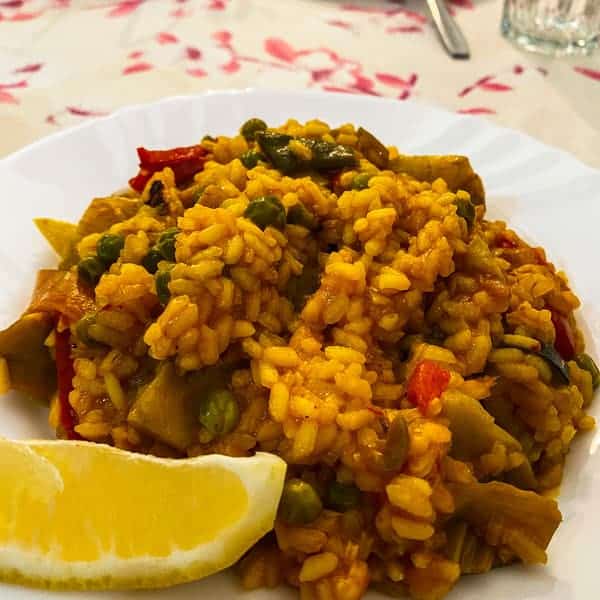
Paella is saffron-flavored rice associated with the Valencia region — part of Spain’s Mediterranean rice-growing area.
MST Tip: Ask for fish or seafood paella.
Salmorejo Cordobes
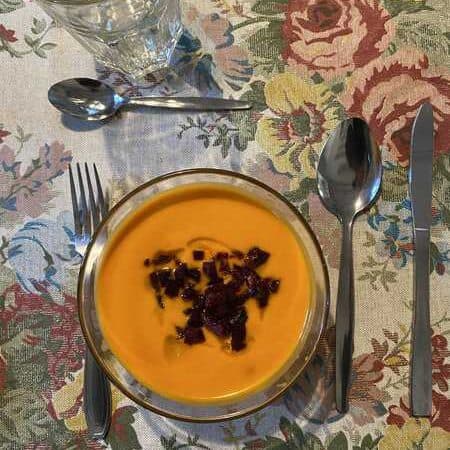
Cordoba’s traditional cold soup is made of tomato puree, extra virgin olive oil, garlic, and bread.
Unlike gazpacho, which is usually served in a tall glass, salmorejo comes in a bowl.
Did you know you can find the menu of the Salmorejo plastered on the wall in Cordoba’s old town?
MST Tip: Traditionally, salmorejo is vegan. But these days, Salmorejo is also served with garnishings of jamon (ham), so make sure you ask for one that doesn’t come with jamon.
Where to taste them: Cordoba! You can find them in most supermarkets.
Gazpacho
From a glimpse, gazpacho looks a lot like salmorejo.
But the difference between these cold soups is that gazpacho is made of mixed vegetables (onions, peppers, cucumber, garlic, tomatoes).
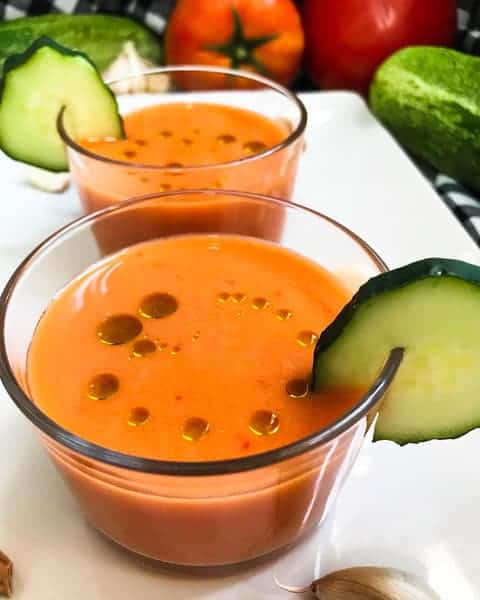
And unlike salmorejo, which consists of bread as a main ingredient, gazpacho doesn’t have bread.
Where to taste them: Also can be found in most supermarkets.
Spanish Tortilla (Tortilla Española)
Did you know, the tortilla in Spain is not the same as the one in Mexico?
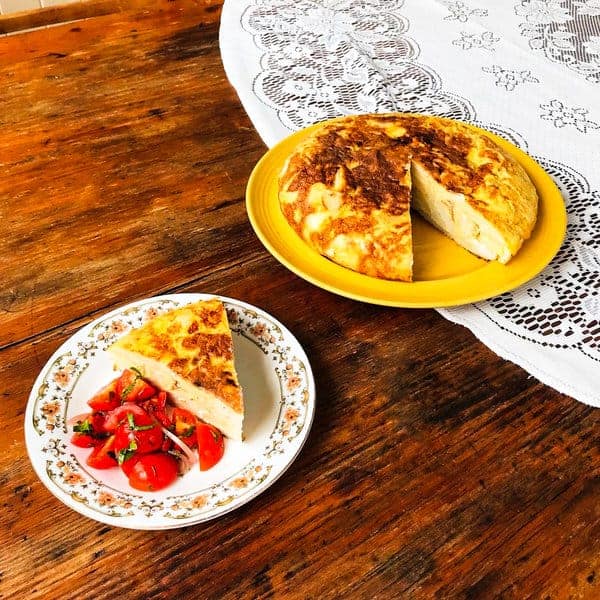
Tortilla is an omelet in Spain that comes in many versions like green beans, spinach, and vegetables.
But the traditional tortilla in Spain is a Spanish potato omelet (Tortilla de patatas)
Not only that, but the Spanish omelet is the national dish of the Spaniards!
Honey Aubergines
This is a popular Vegan tapa in Andalusia that is known as berenjenas fritas con miel.
You can find them mainly in Malaga and Seville.
Where to taste them? Bocaito Andalusi Halal in Cordoba
Churros
While you can easily find crispy churros with a rich chocolatey dipping around the world, did you know that this classic indulgent snack originated in Madrid?
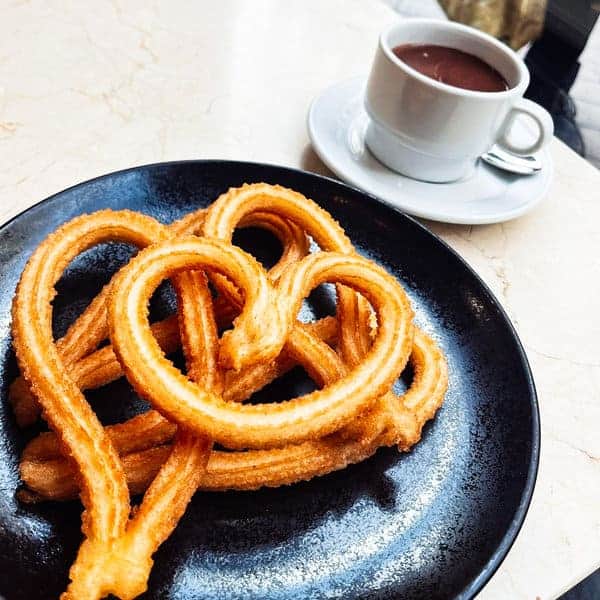
For an authentic local churros experience, be it for a sweet tooth breakfast or midday snack, head on to Chocolatería San Ginés which has been opened since 1894!
- Where to eat Churros: Chocolatería San Ginés (iconic Churros in Madrid)
Horchata
Also known as Horchata de chufas, this is a healthy and refreshing Spanish milk-type drink that is made with Tiger nuts.
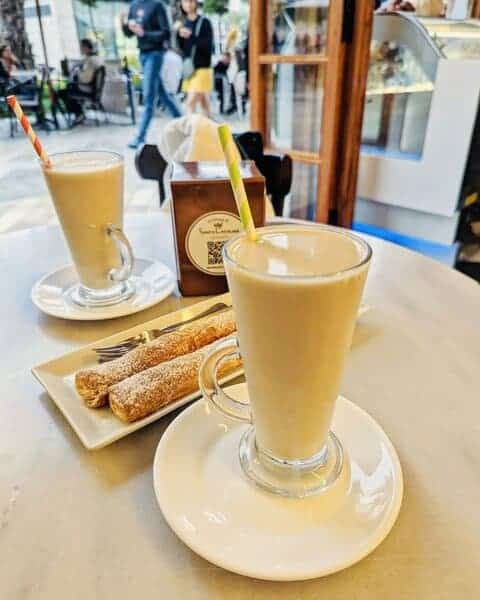
The best place to sample it is in Valencia province, as its town Alboraya is where tiger nuts are grown.
Bocadillo de Calamares (Squid Sandwich)
Out of all the bocadillo sandwiches in Spain, the Squid version is the best known.
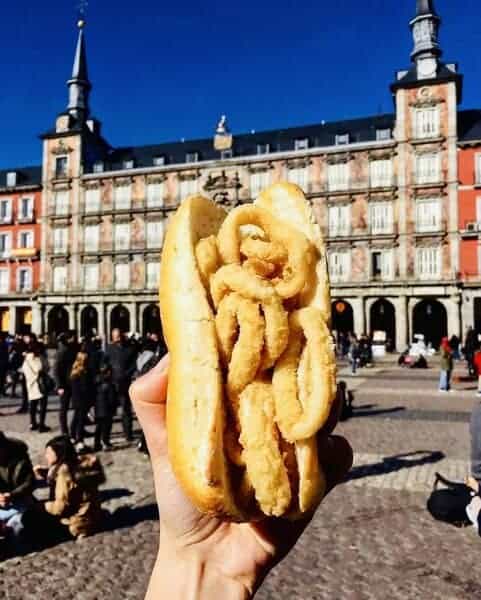
This is calamari dipped in flour, fried in olive oil, and wrapped in a crusty Spanish-style baguette.
They’re found at any corner, especially in Madrid’s Plaza Mayor!
Croqueta (Croquettes)
Traditionally, croqueta is made with ham. These are called Croquetas de Hamon (Spanish Ham Croquettes), so be wary when you see this.
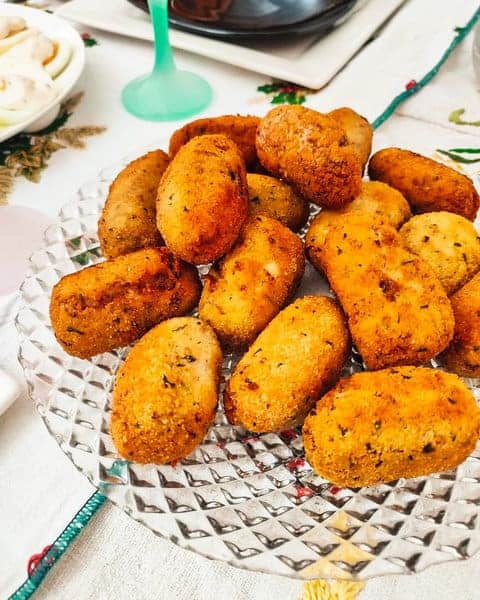
But there are also versions where you can find croqueta cooked with fish like bacalao (cod) or merluza (hake) in fish shops (mentioned below).
Patata Bravas
One of the most famous Spanish tapas is Patatas Bravas.
It literally means “spicy potatoes”.
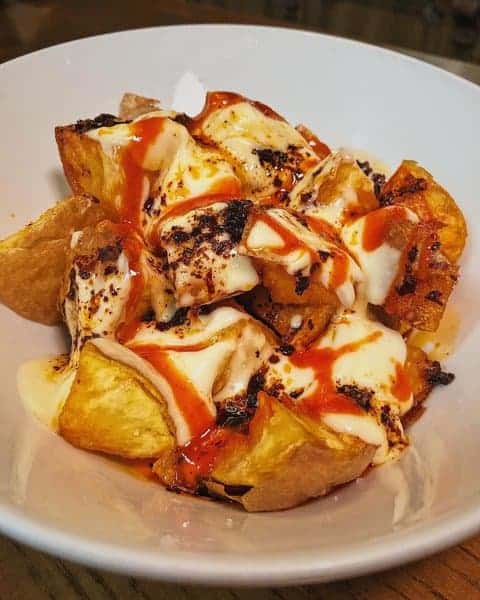
A dish native to Spain, this is an excellent snack for that midday pick-up with the delicious spicy sauce!
Moroccan Halal Food
Now, most of the Muslim food in Spain is found in restaurants and establishments owned by North Africans like Moroccans and Turkish immigrants.
Because of the abundance of Moorish people living in Spain, you’ll easily find Halal places in Spain in Andalusian cities.
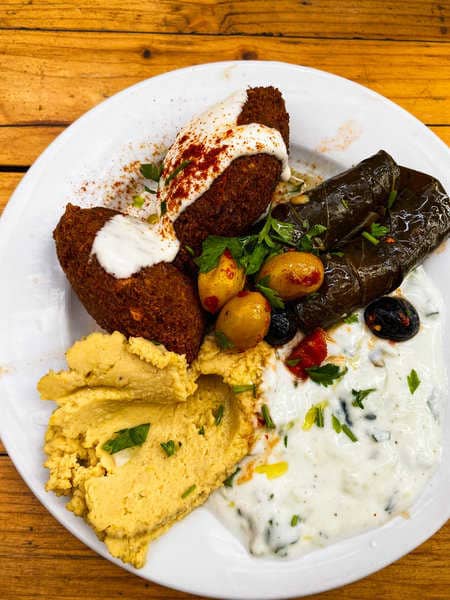
Besides Falafel, babaghanouj, hummus, and Warak Enab (Stuffed Grape Leaves), some Halal Moroccan cuisines that are must-try in Spain are:
Couscous
You’re most likely to find Halal Food in Spain with couscous as its main meal ingredient.
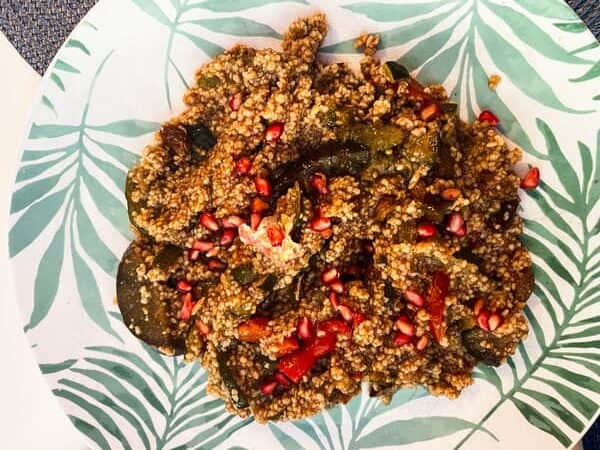
A typical Moroccan dish is couscous steamed with stewed meat and vegetables.
You’ll find lots of Halal restaurants in Malaga, Spain, selling couscous-based dishes like:
- Restaurante Mosaico (directions)
- Restaurante Alyamal (directions)
Tajines
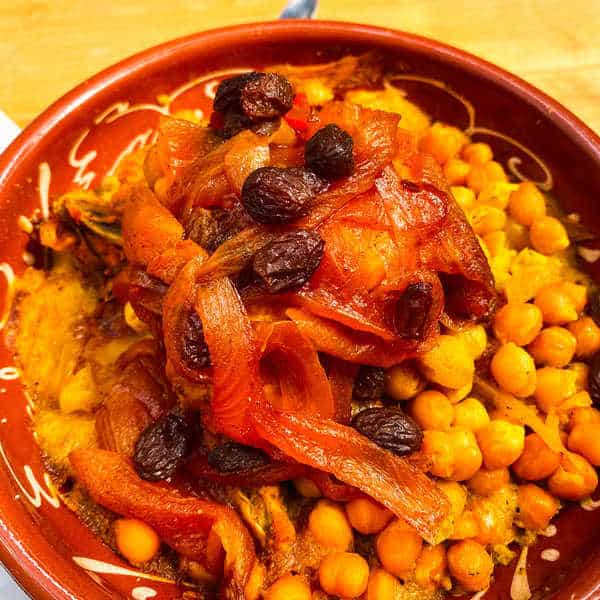
Another must-try Halal Food in Spain is tajines, or tagines.
This refers to slow-cooked Moroccan stews cooked in a specific earthenware pot.
The popular tajine menu includes meatball tajines, chickpea tajines, and any meat with peas tajines.
This is a typical Halal food in Granada, Spain, and other Andalusian cities like Cordoba and Seville.
Teterias (tea rooms)
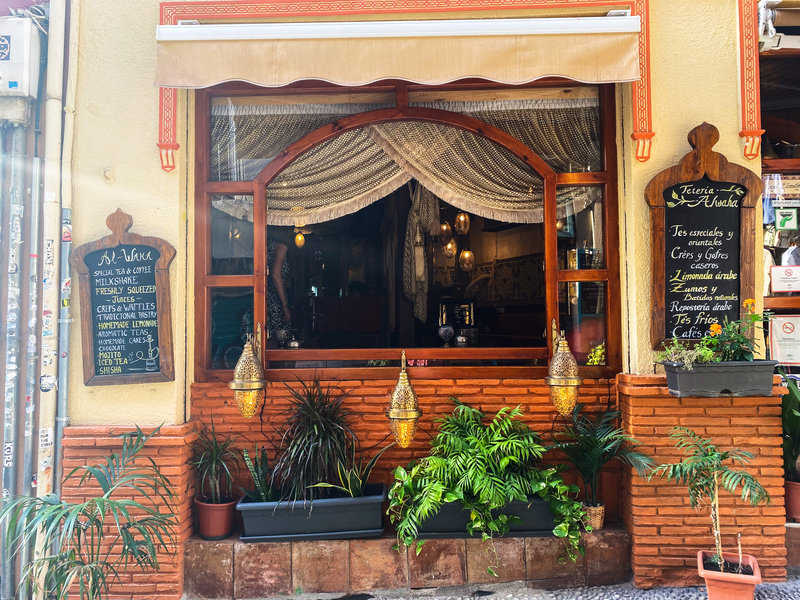
In Andalusian cities like Granada and Cordoba, you’re most likely to find tea rooms (teterias) that are operated by Muslim owners.
Freidurías (Fried Fish Shops)
Fish-only establishments are widely available in the Andalusia region.
They’re called freidurías.
In general, the ones in Andalusia don’t serve meat, which is usually fried separately because of the “no-mix” rule, so the probability of cross-contamination is at a minimum.
However, seafood restaurants in major cities like Madrid may even have meat on the menu, so best to ask if you’re unsure.
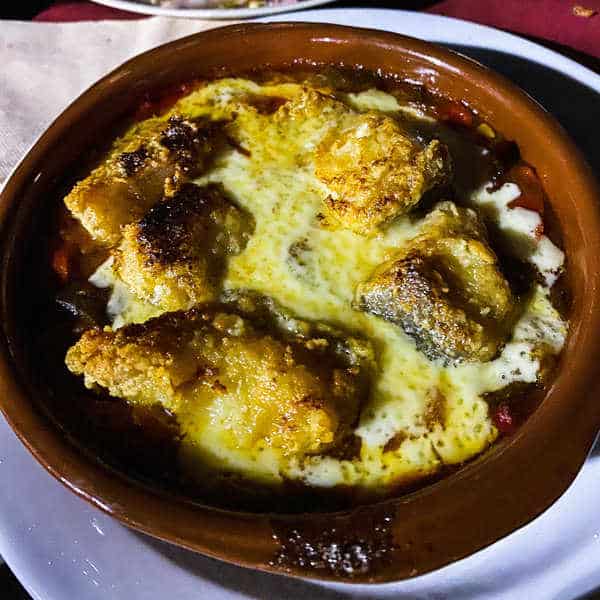
Words to know: Bacalao al Ajo Tostado (Roasted Garlic Cod)
Read this Solo Trip to Cordoba Guide, which features Halal food in Cordoba, Spain, as well as Things To Do, Safety for Muslimah Solo Travelers, and more!
Non-Halal Words to watch out: Jamon (Ham)
Jamon (ham) is the pride of Spanish cuisine, so without a doubt, you’ll find them in most Spanish restaurants.
They usually have them hung visibly from the ceiling in bars and restaurants.
Salmorejo (Cordoba’s iconic cold vegetable cream dish) is sometimes served with ham toppings. So when you order salmorejo, insist on “no jamon”.
Halal-certified Restaurants/Services/Kitchen in Spain
Instituto Halal (Halal Institute) of Junta Islámica is Spain’s main Halal certifying entity.
What to know about Halal in Spain: When you see a certified Halal logo at a place, this can mean that the Halal certification applies to either (1) the whole establishment, (2) certain products, and services, or (3) to a specific kitchen. So, do ask which service is Halal if you see this.
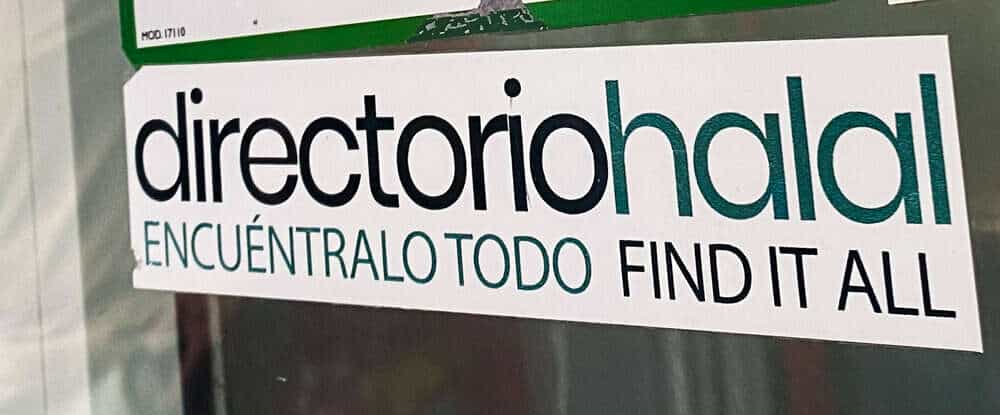
If you see a shop labeled with Let’s Go Halal, that’s also another indicator that the premise is accredited to approved Halal standards.
“Halal” Establishments in Spain that Offer Alcohol
When looking for Halal food in Madrid, Spain, you may stumble upon restaurants with the Halal logo that are also serving alcohol at the same time, as mentioned above.
We have seen them.
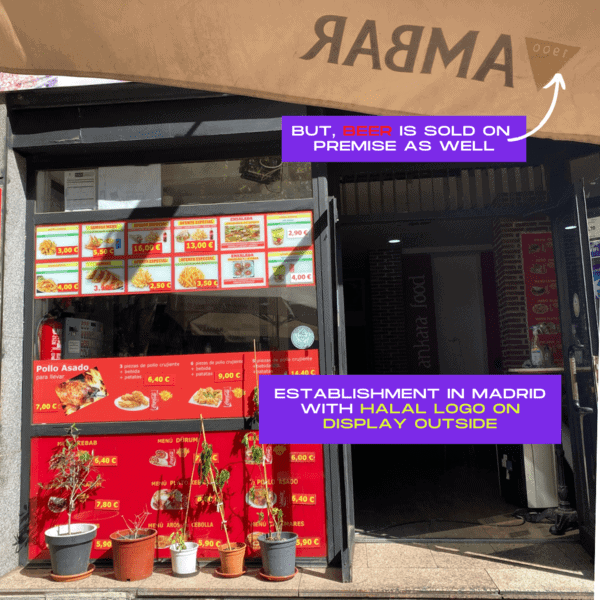
For many Spaniards who are non-Muslims, Alcohol is a “must-have”. If a restaurant doesn’t have alcohol, the owner would argue “to better close off the restaurant than running a business”.
These patrons have a large non-Muslim clientele but also would like to serve Muslims as well. So do not be alarmed when seeing a restaurant putting a Halal sign but also serve alcohol.
In such situations, it is wise to judge yourself whether to proceed eating there or not.
Alcohol-free restaurants are mostly found in Muslim-majority neighborhoods, particularly in Andalusian cities.
Self-claim Halal & Muslim-owned Restaurants
According to Lets Go Halal, “95% of Halal restaurants in Spain are owned by Muslims, have staff who are also Muslims.”
Some are also not bothered to get accredited.
So if you see a typical self-claim Halal symbol, or visible exterior signs that the restaurant is Muslim-owned, like Indian, Persian, Turkish, and Middle Eastern restaurants, you can rest assured that they serve Halal meat in Spain.
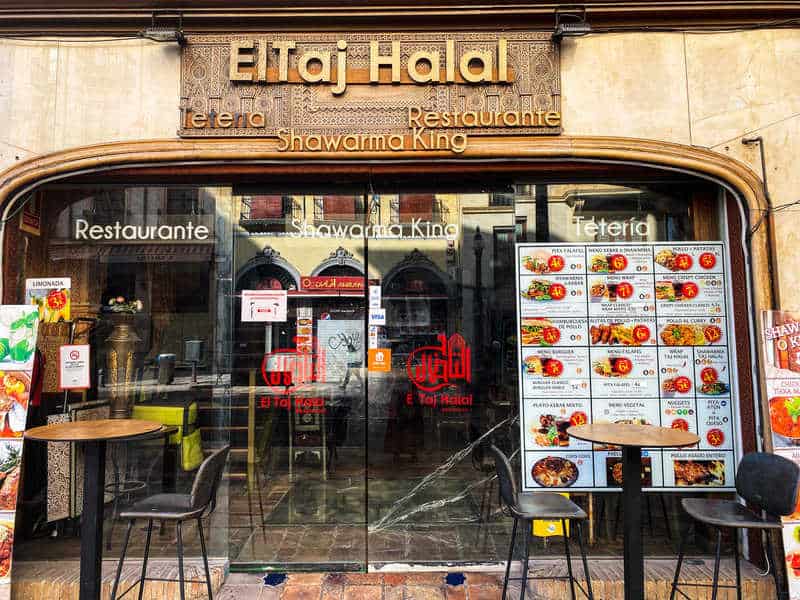
If you’re still unsure, ask directly.
Halal Food in Spain
We hope this Halal Food in Spain guideline has been helpful in helping you make your choices to distinguish what is Halal in Spain.
Some Halal Food guides that you might be interested in our Halal Food in New York City, Halal Food in Los Angeles, and Halal Food in Dubai.
Be A Part of the ?? #MuslimahSoloTravelers ? Community ?
